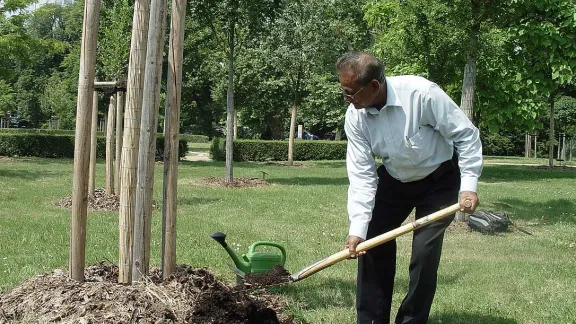
ELCG Secretary Samuel Jerry Goolsarran plants a tree at the Luther Garden in Wittenberg, Germany, on 10 June. Photo: LWF Center in Wittenberg/Annette Glaubig
Planting Trees as a Living Memorial to the Beginning of the Reformation
(LWI) – During a recent visit to Geneva, Evangelical Lutheran Church in Guyana (ELCG) Secretary Samuel Jerry Goolsarran spoke about the importance of the 500th anniversary of the Reformation in 2017, planting a tree in commemoration, and the challenges his small church faces today in training enough pastors and being relevant in society.
The ELCG secretary also planted a tree at the Luther Garden in Wittenberg, Germany on 10 June, joining other church representatives who plant trees in the park, leading up to the celebrations in 2017.
The Lutheran World Federation (LWF) has set a goal of planting 500 trees in the park and around the town to commemorate the anniversary of the Reformation, when on 31 October 1517 Martin Luther nailed his theses on the church door in Lutherstadt, Wittenberg. Churches of all denominations from all over the world are also invited to become "godparents" to one of the trees in Wittenberg and to plant a second tree in the area of their home parish.
“We want to re-identify that we are long-standing members of The Lutheran World Federation (LWF) and we are happy to be connected with this great historical event in solidarity with the Lutheran world communion,” Goolsarran said. “We are only instruments in planting the seed and the Holy Spirit does the rest.”
The Guyanese Lutheran church was initiated in 1743, when a group of Dutch colonists assembled at the home of Lodewyk Abbensetts to start a church at Fort Nassau. Nine years later it received its first pastor, Johan Henrik Faerkenius, and constructed a sanctuary. A Guyanese pastor represented the church at the 1947 founding Assembly of the LWF. In 1950 the Evangelical Lutheran Church in then British Guiana was received into LWF membership.
Goolsarran said challenges the ELCG faces in proclaiming the gospel in the Caribbean country today include a shortage of pastors in full-time ministry and keeping young people engaged in the church.
With 16,000 to 17,000 members, “in terms of resources—dedicated pastors in full-time ministry—we are really stretched out in keeping the services and Sunday activities going,” he said. “We really need about 20 full-time pastors and we only have nine, and 13 deacons. We have created a situation where we are training them locally as we do not have the resources to send them abroad.” Migration has also had an impact on the number of pastors as “large numbers of our clergy are working in North America,” he added.
“On any Sunday, you will find a strong lay leadership in the church and half the congregations are lay people and that has been the case for many years,” Goolsarran said.
The ELCG is the first Christian denomination in Guyana to embark on local training for its members to become pastors and deacons. It is promoting a new model of being church by including in the pastoral ministry ordained pastors and deacons. The ELCG Lutheran Lay Academy (LLA), launched in 2005, offers a two-year program with pastors serving as lecturers and resource persons for biblical studies, church history, homiletics, worship and liturgy. External experts in theology provide additional support.
In Guyana, “evangelism needs to be revitalized to reach out to the communities, children and young people and to keep the youth in Sunday school ministry,” Goolsarran said. “There is a lot of competition for the time of young people these days from TV to the internet and all these gadgets that we have around and the attraction of modern society life.”
“The main challenge for us is to get the gospel out, to bring in the people to plant the seeds so that the Holy Spirit can work to bring them into church,” he added.


